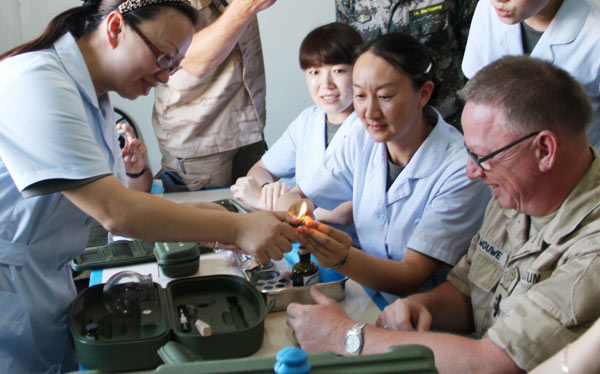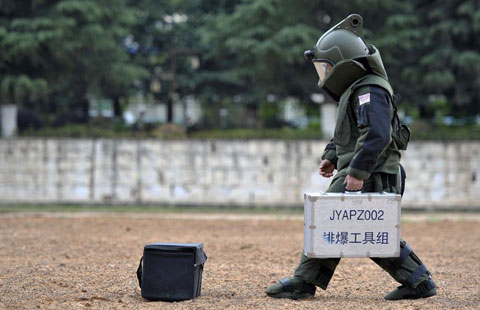Nurses embark on journey to the West
By Yang Wanli reports in Hamburg and Tang Yue in Beijing ( China Daily ) Updated: 2013-09-25 08:19:48Medical workers are broadening their horizons, as Yang Wanli reports in Hamburg and Tang Yue in Beijing.
|
 |
|
Nurse Zhang Yongmei (left), who is on a peace mission in Beirut, shows a medical kit of traditional Chinese medicine to her counterparts from Belgium during an exchange activity. YANG SHENGCHAO / XINHUA |
Song Xi, a 24-year-old nurse, is planning her trip to Germany, but the preparations have been far from easy.
She has only been abroad once before, to Vietnam, and this time her journey will not be a short sightseeing trip, but a working visit for three to five years.
When it comes to hiring nurses, turning to Chinese recruits is nothing new.
As many countries face the problem of an aging society and difficulties in hiring nurses - due to work stress and low wages - employing Chinese workers has become popular in some Asian countries including Singapore, Japan and South Korea.
However, working in Western countries, including Britain and Canada, is an emerging trend. In Germany, the European Union's richest country, such an opportunity for nurses has been allowed only since July.
Song is among the first group of nurses to benefit from the new policy in Germany. Under an agreement signed by China and Germany at the end of 2012, some 150 Chinese nurses will work in the European country from 2013, with the first 25 leaving in October.
|
Shortages trigger demand overseas Germany has a history of hiring nurses from abroad when they are in short supply at home, recruiting South Korean nurses as far back as the 1960s, for example. Figures from the German Federal Employment Agency show there were 759,245 nurses employed in Germany by June 2011, of which 26,959 were foreigners. In the US, there are 2.5 million registered nurses, according to US Labor Department data. It is estimated that the country has a shortage of 120,000 full-time registered nurses each year, and this figure is forecast to grow to 500,000 by 2020. In Britain, National Health Service figures show that more than 8,000 nurses left to work abroad in 2012, the most ever. Due to this exodus and an aging workforce in health care, the UK is experiencing an escalating crisis in recruitment of nursing staff, threatening the high quality of clinical services. Nursing vacancies in Japan will reach 450,000 by 2025, according to the government's forecast. The nation, whose aging population has reached 23 percent, is turning to foreign nurses to help. For example, under a bilateral economic partnership agreement hospitals in Japan have employed health workers from the Philippines since 2009. Since Fidel Castro's forces were victorious in the Cuban revolution in 1959, the Caribbean island has sent up to 130,000 health workers overseas to fill the rising number of hospital vacancies. Government figures show that about 37,000 Cuban medical staff are working abroad in more than 70 countries and regions. - Yang Wanli and Zhou Huiting |
Although she couldn't afford to study overseas, Song never abandoned her dream. After studying foreign nursing care at Hubei University of Chinese Medicine for five years, she worked as an intern at a local hospital in 2012.
"But it was hard to practice what I learned in college. For example, health education was not highly valued," she said.
During this time, she heard of the nursing program between China and Germany, feeling the time was right to make a move. "I believe this working experience will give me a chance to be a real nurse," she said.
The shortage of nurses has become a problem in Germany, which has had an aging society for decades.
In July, 4,393 nurses in Germany were registered as unemployed, with 6,792 vacancies announced to the German Federal Employment Agency. For nurses caring for the elderly, there were 3,517 registered as unemployed, with 9,080 registered vacancies.
"In Germany, employers are not obliged to announce their vacancies to the Federal Employment Agency, so the latter figure might be even higher," said Marcel Schmutzler, a press official with the agency's International Placement Services Department.
Franz Wagner, chief executive officer of the German Nurses Association, said that in the past 10 years most of the foreign nurses in Germany came from Poland and Romania.
He said there are cultural differences and differences between the roles of nurses from country to country. "A nurse from Europe probably finds it easier to adjust than somebody from Asia or Africa," he said.
Huge population
Although the number of Asian nurses has not risen significantly in the past year, Wagner said Asia has become interesting for German employers, because of its huge population - China and India, in particular.
He said German employers have also found it difficult to find nurses in Europe who want to work in Germany, because working conditions for them there are not competitive when compared with those in Scandinavian countries, Britain or the United States.
"In these countries, nurses find better conditions, such as a lower workload, better recognition and image, less overtime and better salaries," Wagner said. "In addition, German is a difficult language to learn."
Although she has had German-language and culture training since September 2012 and has passed the language test, Song still lacks confidence in her upcoming trip.
"I watched some German TV programs, but felt they were hard to understand because they speak fast and sometimes with dialects," she said. "And also the letter 'r' is very difficult to pronounce."
Other questions about living in Germany are also on her mind. Are all shops and restaurants closed on Sundays? Can you still eat rice in a Western country? And do you have to buy boots in Germany, because of thick snow and extreme cold in winter?
A win-win deal
Compared with the average monthly salary of about 3,320 yuan ($540 or about 400 euros) for a nurse in China, working overseas represents a good deal.
Wang Zhuwen, director of operations at Shandong International Nurse Training Center, which is responsible for training the 150 Chinese nurses who will work in Germany from this year, said: "Most overseas Chinese nurses earn more than they do in China. In Germany, the gross starting salary for nurses in public hospitals ranges from 2,190 to 2,365 euros ($2,957-$3,193) a month."
|
|
|
|
|
|
|
|


















 Op Rana
Op Rana Berlin Fang
Berlin Fang Zhu Yuan
Zhu Yuan Huang Xiangyang
Huang Xiangyang Chen Weihua
Chen Weihua Liu Shinan
Liu Shinan